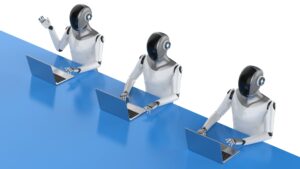
Amid a time filled with crucial economic uncertainties and concerns, one particular enigma regarding the long-term state of the US economy continues to intrigue me: Could artificial intelligence be displacing jobs for young individuals already? The ongoing discourse surrounding AI’s impact on the job prospects of recent graduates may lead one to ponder whether the answer leans towards “potentially,” “certainly yes,” or “highly unlikely.” Let’s delve into this further:
1. Potentially! Earlier this year, an essay in The Atlantic raised the notion that subdued hiring rates among young college graduates could signify a disruption caused by AI. This observation stemmed from a report by the New York Federal Reserve which highlighted a noticeable decline in job opportunities for recent college grads. Among various explanations, including economic policies and uncertainties, there was a consideration that companies might be utilizing ChatGPT to perform tasks previously assigned to young graduates. According to economist David Deming from Harvard University, generative AI has the capability to replace tasks typically carried out by young professionals in white-collar settings.
2. Certainly yes! Subsequent to the essay’s publication, prominent news outlets and AI experts endorsed even more assertive versions of this hypothesis. The New York Times suggested that an “AI job crisis” might already be affecting recent graduates. Axios reported that AI was hindering job prospects for recent college grads. In an interview foreseeing significant labor market changes, Anthropic CEO Dario Amodei even predicted that AI could eliminate half of all entry-level white-collar jobs within five years. By June, the narrative suggesting AI’s impending disruption of the college-graduate workforce had gained traction.
3. Highly unlikely! As concerns over AI intensified, insightful analysts raised doubts about the entire premise. An Economic Innovation Group report scrutinized government data and found minimal evidence linking AI to unemployment, with most firms reporting no net employment impact due to AI. Financial Times’ John Burn-Murdoch noted a reversal in the contraction of tech hiring at entry levels recently. Economist Noah Smith synthesized extensive research on this topic and concluded that evidence strongly refuted claims of AI eradicating jobs for new graduates or tech workers.
Initially convinced that AI wasn’t significantly impacting young people’s employment opportunities, recent findings have prompted me to reconsider my stance once again.
A recently published study by Stanford economists analyzed payroll data from ADP and discovered a 13% drop in employment among young workers aged 22-25 in highly AI-exposed roles since ChatGPT’s introduction. Conversely, older workers and less-exposed occupations experienced stable or increasing employment levels. This latest revelation adds another layer to the question of whether AI is diminishing job prospects for young Americans.
In essence, this ongoing debate underscores the importance of informed discussions backed by rigorous analysis when addressing major societal and economic shifts like those potentially instigated by artificial intelligence.
